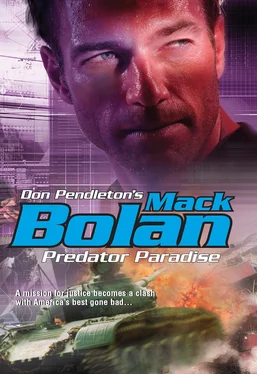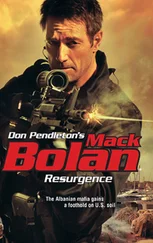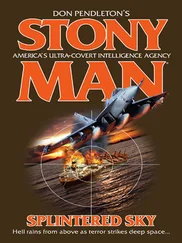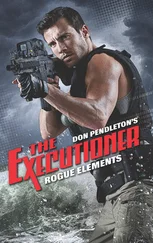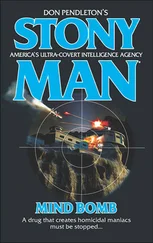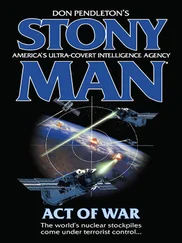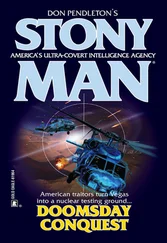The Executioner took stock of the situation
He was under no grand illusions about their effort to strike back at terrorism, in this or any other mission. The new war had shifted tactics, going preemptive in world headlines, but it was still the same never-ending battle for the Executioner.
No matter how many they took out, it was a monumental task to expect even the most skilled and determined force to rid the planet of what the Administration tagged as evildoers. There would always be more terrorists when the sun rose the following day.
It never stopped for Bolan.
Other titles available in this series:
Storm Burst
Intercept
Lethal Impact
Deadfall
Onslaught
Battle Force
Rampage
Takedown
Death’s Head
Hellground
Inferno
Ambush
Blood Strike
Killpoint
Vendetta
Stalk Line
Omega Game
Shock Tactic
Showdown
Precision Kill
Jungle Law
Dead Center
Tooth and Claw
Thermal Strike
Day of the Vulture
Flames of Wrath
High Aggression
Code of Bushido
Terror Spin
Judgment in Stone
Rage for Justice
Rebels and Hostiles
Ultimate Game
Blood Feud
Renegade Force
Retribution
Initiation
Cloud of Death
Termination Point
Hellfire Strike
Code of Conflict
Vengeance
Executive Action
Killsport
Conflagration
Storm Front
War Season
Evil Alliance
Scorched Earth
Deception
Destiny’s Hour
Power of the Lance
A Dying Evil
Deep Treachery
War Load
Sworn Enemies
Dark Truth
Breakaway
Blood and Sand
Caged
Sleepers
Strike and Retrieve
Age of War
Line of Control
Breached
Retaliation
Pressure Point
Silent Running
Stolen Arrows
Zero Option
Predator Paradise
Don Pendleton

In the United States, we go to considerable trouble to keep soldiers out of politics, and even more to keep politics out of soldiers.
—Brigadier General S. B. Griffith II, USMC
Introduction to On Guerrilla Warfare
Mao Tse-tung, 1961
Powerful people in league with certain aspects of the military have the ability to move mountains—or to unleash untold misery on humankind. Left unchecked, the butcher’s bill could be exorbitant. Can we afford the tab?
—Mack Bolan
PROLOGUE
CHAPTER ONE
CHAPTER TWO
CHAPTER THREE
CHAPTER FOUR
CHAPTER FIVE
CHAPTER SIX
CHAPTER SEVEN
CHAPTER EIGHT
CHAPTER NINE
CHAPTER TEN
CHAPTER ELEVEN
CHAPTER TWELVE
CHAPTER THIRTEEN
CHAPTER FOURTEEN
CHAPTER FIFTEEN
CHAPTER SIXTEEN
CHAPTER SEVENTEEN
CHAPTER EIGHTEEN
CHAPTER NINETEEN
CHAPTER TWENTY
CHAPTER TWENTY ONE
CHAPTER TWENTY TWO
CHAPTER TWENTY THREE
CHAPTER TWENTY FOUR
CHAPTER TWENTY FIVE
EPILOGUE
Habir Dugula was no stranger to death. He knew there were many ways to die in his country, most of them brutal. Old age rarely claimed life in Somalia. The land itself could kill a man without water in a matter of hours.
The parched and unforgiving earth produced next to nothing to feed ten million hungry mouths. The country’s famine, though, was no secret to Western relief workers, he knew, nor to the world at large for that matter, thanks to naive intrusion by CARE, UNICEF, the Red Cross and the United Nations, which seemed to take a morbid pride in denouncing his nation as a seething hotbed of outlaws, thieves and genocidal maniacs.
Starvation, so it was said, had laid waste to nearly a half-million Somalis in the past five years, another two million on the brink, if he was inclined to believe UN or Red Cross statistics. Those numbers, in his mind, were greatly exaggerated—propaganda—if only to give the West excuses to make incursions into his nation, strip him of power and return Somalia to the control of white colonial imperialists. It was true, however, that he was branded the Exterminator by the United Nations, the devils of the American media. To some extent he was responsible for the plight of the starving, at least in the area he controlled south of the city. He had his reasons, plus the blessing of God, to maintain a certain population control, and that was enough. First, they would want food, then, bellies full, education would be the next demand, minds alive and seething soon enough with what they perceived a monstrous injustice perpetrated on them by him. With the power of knowledge there was little doubt an uprising was sure to find its way to his front door.
Not if he could help it.
There would always be too many hungry mouths to feed, he knew, always the poor and the needy who would fall by the wayside, and he didn’t intend to let the great unwashed, the weak and the vanquished weigh him down, hold him back from climbing the next rung up the ladder of power and glory. As long as he didn’t have to look at the dying masses on his doorstep, there was no point burdening himself with guilt. Sentiment was weakness.
Then there was civil war, consuming another half-million or so lives in the past decade, what with roughly five hundred clans divided into twenty-six main factions, all of them heavily armed, shooting up one another in a running bloodbath that saw no end in sight. There was widespread disease, savaging mostly the children, but again, if he didn’t have to see it…
Why bother, he decided, to attempt to search for reason when madness and the law of the gun ruled his country? How could a man show mercy to even the poor and the needy when his own survival was always in question? As leader of his clan, there was a bottom line, deemed by him every bit as important as seeing the next sunrise. If death, war, famine and pestilence appeared destined to push millions of Somalis to the edge of the abyss, the least he could do for himself—and the continued survival of his clan—was to profit from the madness somehow. Even in the hell that was his country, cash was still king.
So was the power of the gun.
Dugula had a busy day ahead. He rose from behind his desk, checking the wall map and factoring in the grueling stretch of miles needed to take him to the afflicted village and its refugee camp, due southwest of Mogadishu. Three events on the day’s agenda, a long, hot twelve hours or more before him, and it was time to embrace death once again. The grim problem could prove the first order of the day’s business, but, then again, he concluded, it was best to deal with the most troubling and by far the most hazardous of his three chores.
Listening to the soft hum of the air conditioner, pumping out icy waves through the office of his command-and-control center, he knew that once he stepped outside, the sweat would start to flow free and unchecked. Discomfort he could live with, but uncertainty he wouldn’t entertain, since not having answers to certain questions, not knowing who or where his enemies were, could kill. Indeed, the first outbreak of sweat, he thought, would be brought on by more than just the brutal hammering of sunlight.
He watched as Nahbat, his AK-47 leading the way, swept through the door.
“They are on Aboyge Street. Perhaps three minutes remain before they arrive.”
Dugula grunted, a slew of questions about the visitors tumbling through his mind. He picked up his AK-47, chambered a round, aware of the numbers coming their way. “Assemble everyone in the courtyard. Same drill as before. Do it quickly, and may God pity the first man who is not ready to fight to the death, if necessary, because I will not show mercy to cowards.”
Читать дальше
